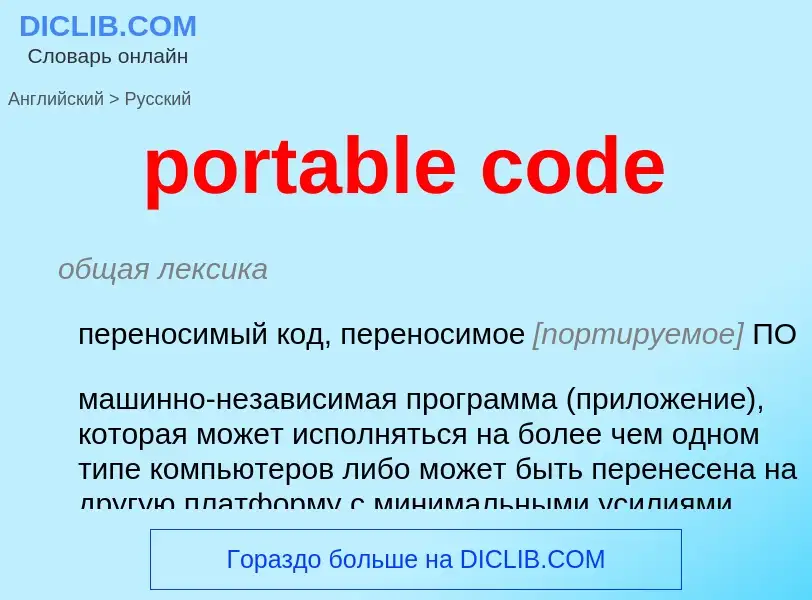Translation and analysis of words by ChatGPT artificial intelligence
On this page you can get a detailed analysis of a word or phrase, produced by the best artificial intelligence technology to date:
- how the word is used
- frequency of use
- it is used more often in oral or written speech
- word translation options
- usage examples (several phrases with translation)
- etymology
portable code - translation to English
общая лексика
переносимый код, переносимое [портируемое] ПО
машинно-независимая программа (приложение), которая может исполняться на более чем одном типе компьютеров либо может быть перенесена на другую платформу с минимальными усилиями
синоним
Смотрите также
общая лексика
промежуточный код
код, генерируемый во время первого прохода компилятора. На стадии кодогенерации из него легче получить объектный код для заданной целевой машины
общая лексика
байткод
код, в который компилируется программа, написанная на языке Java. Он независим от архитектуры конкретного процессора, может быть передан по сети и исполнен на любом компьютере, где имеется интерпретатор виртуальной Java-машины
Смотрите также
Definition
Wikipedia
Bytecode (also called portable code or p-code) is a form of instruction set designed for efficient execution by a software interpreter. Unlike human-readable source code, bytecodes are compact numeric codes, constants, and references (normally numeric addresses) that encode the result of compiler parsing and performing semantic analysis of things like type, scope, and nesting depths of program objects.
The name bytecode stems from instruction sets that have one-byte opcodes followed by optional parameters. Intermediate representations such as bytecode may be output by programming language implementations to ease interpretation, or it may be used to reduce hardware and operating system dependence by allowing the same code to run cross-platform, on different devices. Bytecode may often be either directly executed on a virtual machine (a p-code machine, i.e., interpreter), or it may be further compiled into machine code for better performance.
Since bytecode instructions are processed by software, they may be arbitrarily complex, but are nonetheless often akin to traditional hardware instructions: virtual stack machines are the most common, but virtual register machines have been built also. Different parts may often be stored in separate files, similar to object modules, but dynamically loaded during execution.

